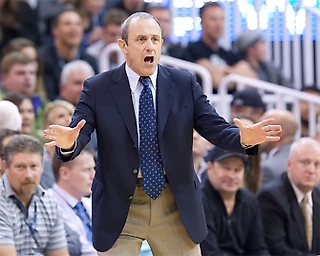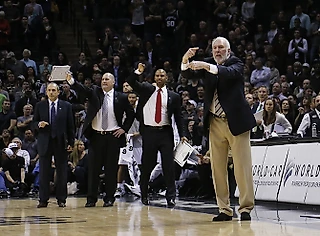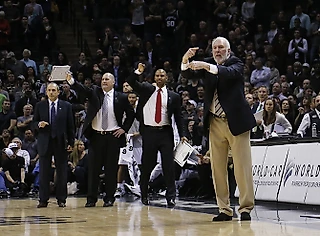Pluses and minuses of schedule anomalies
This journey to the Final Four wasn’t easy for anybody. We started the season with lots of question marks given the number of roster changes we had to endure. At several points of the season we struggled for different reasons. Injuries, lack of the right mentality… Fortunately, our players made great strides and really stepped up over the course of the season.
We also had to overcome in-season personnel changes, parting ways with Drew Nicholas and Dionte Christmas and adding Theo Papaloukas to the mix. Theo is a player of outstanding leadership skills. He can and will share that load with some other experienced players on the roster, making the burden easier for them. And it’s his ninth Final Four, so he’ll definitely help younger guys deal with the inevitable and sometimes overwhelming pressure that comes with scrutiny, the level of attention, and the fact that a big celebration is coming up and you want to in its center, not on the outside looking in. Theo is preparing really well, he’s been playing his best basketball of the season lately, so those are the reasons to believe he’ll be important for us in London.
Several adjustments were made with the players on the roster during the season. Like, we successfully tried using Nenad Krstic at power forward, sometimes pairing him with Sasha Kaun and playing Viktor Khryapa at the 3 in big line-ups. All in all, our leaders were consistent for the biggest part of the Euroleague season, coming through when it mattered the most and helping us secure home-court advantage for the play-offs which was a good thing considering the atmosphere you have to face when you play away games in some countries.
I’m quite happy with what we’ve achieved so far, and I think everybody – players, management, fans – should be happy as well. The new Euroleague format is quite challenging, to say the least. In the past years, we used to play 22-23 Euroleague games during the season and then we would have the Final Four in late April or early May. Now it’s different. The paradox is, after playing a very condensed Euroleague season with lots of games, at the moment we find ourselves in a situation where we’re going to play just one game during the two-week period prior to the Final Four. And other than pride and history, nothing will really be at stake for that Khimki game.
Such schedule anomalies could bring some pluses and many more minuses. Like, even though you know that the Olympiakos game will only be played in 10 days, it could still prove quite difficult to focus on a different opponent.
Back in 2008, before going to Madrid and winning the title there, CSKA faced Spartak-Primorye from in round 1 of the national play-offs. Our opponents kindly agreed to play out the best-of-3 series here in Moscow, so that we didn’t have to go all the way to Vladivostok before the Euroleague Final Four. CSKA won the series in 2 games but in both of them we were behind for considerable periods, clawing victories down the stretch. I remember I was furious; my players were mad at me, mad at themselves, mad at the whole world. In retrospect, it was just really hard to prepare for those games.
Then, I guess in the last year of my previous stint with CSKA, we invited Efes Istanbul to play two friendly games before the Final Four. In terms of real preparation those games weren’t much better than contests with Spartak Primorye. The atmosphere was really strange as everybody understood those weren’t actual games.
Still, you’ve got to prepare and you can’t just do it running no-contact drills. You need some real-action experience, and in that regard the Khimki game will come handy. Hopefully, the level of the opponent and the on-going rivalry will help us focus on that game and forget for a time about the challenges ahead.
The Khimki game will also help us decrease the risk of overpreparing the team. One of the biggest challenges for any coach going into the Final Four is finding the right balance between preparing the team and avoiding a premature exposure to the overwhelming pressure that comes with being this close to the title. You cannot drift away from your usual practice routine too much. Like, playing Real Madrid, Panathinaikos, Barcelona or Caja Laboral this year we usually had three days to prepare for each game. And we can’t radically change that just because it’s Final Four or because we have some extra spare time on the schedule. We can’t, for example, put our players under pressure of preparing for that game for five days. You want your players to step on the court on game day with the desire to win, not with the mental and physical exhaustion that comes with preparing for too long.
So, we dedicated last week to physical work. We needed to get ourselves into top shape because soon we’ll need to play every 2-3 days, considering that the United VTB League play-offs start right after the Euroleague Final Four.
As for the challenges that await us in London, surely there’s a lot of extra drama stemming from the fact that in the semifinal we’ll square off against CSKA’s nemesis from last year. We all remember that stunning, painful, out-of-nowhere comeback by Olympiakos. Technically and physically, it’s going to be a very difficult game. In the modern history of Euroleague, only Maccabi, CSKA (twice), Kinder Bologna, Panathinaikos and now Olympiakos managed to reach the Final Four the year after winning the title. To me, it speaks volumes about their team. And they did it with a new coach, after adopting a new philosophy. In the fifth game of their play-off clash with Anadolu Efes they were down by 15 and came back without changing their style. They showed resilience, desire and character. It was very impressive. And going into the Final Four as reigning champs will surely give them extra confidence. We have to be ready for that. In the end, it’ll all go down to which team be able to control its collective nerve, focus on the basics like rebounding and passing, take care of the ball under pressure and generally remain true to its playing style.
May is usually when individual awards are being voted for and announced. I’m going to make no secret of the fact that I voted Viktor Khryapa for Defensive Player of the Year. There’s no doubt he played outstanding defense this year, dominating games on that end. He’s thoroughly deserved this award.
As for the Rising Star, I voted Nikola Mirotic from Real Madrid. He’s a young guy who already plays like a veteran and surely has bright future ahead of him. I had the pleasure and honor to coach him in Madrid, and he’s been nothing but an exemplary pro there. His attitude towards practices and desire to get better are second to none. I don’t relish the possibility of playing against him in London. I wish him all the best.
I also want to emphasize that at CSKA we have a lot of players worthy of individual honors, be it the first All-Euroleague team or the second one. I do hope they get all the awards they can get, and then we go on and have a great Final Four as a unit, as a team.




